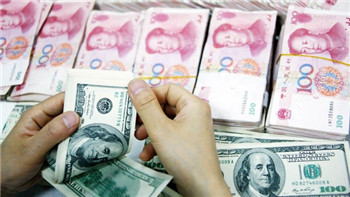(单词翻译:单击)

I look back on my time as a wide-eyed markets reporter at the start of my FT career as particularly instructive. I learnt that although I knew next to nothing about global financial markets, no one else seemed to know much either.
回想当初进入英国《金融时报》工作时,我是一名毫无经验的市场记者,现在看来,那段经历特别具有启发意义。我了解到,我对全球金融市场几乎一窍不通,但其他人似乎也知道得并不太多。
My early-morning calls to analysts and fund managers often went along the lines of:
大清早,我给分析师和基金经理打电话时,对话内容经常是这样的:
Me: “Why is the Nikkei up today?” Mr Market: “Because Wall Street was up last night.” Me: “So all you highly paid financial whizz kids are simply going to copy what has already happened elsewhere?” Mr Market: “Yeah, sounds about right.”
我问:“今天日经指数(Nikkei)为何上涨?”市场先生答:“因为华尔街昨晚上涨了。”我问:“那么说,你们这些拿高薪的金融天才们,仅仅是追随其他市场的走势嘛?”市场先生答:“是的,听起来是那么回事。”
I was reminded of such conversations last week, when the latest in a series of gut-wrenching market swings that have peppered the early days of 2016 sent global equities spiralling higher on the Monday.
2016年初,市场上发生了一连串让人揪心的波动。上周,当最新一次波动在周一推高全球股市时,这让我回想起了以前那种对话。
Many professed to be puzzled by the rally. In reality, the causality was clear, even if mystifyingly lacking in logic.
许多人承认,他们弄不明白股市为何上涨。在现实中,因果关系是显而易见的,尽管逻辑缺乏得令人困惑。
Early in the day, China had allowed the renminbi to jump 1.2 per cent against the dollar, the biggest one-day move since the People’s Bank of China started to liberalise the currency in 2005.
当天早上,中国将人民币兑美元汇率中间价提高了1.2%,为2005年中国央行(PBoC)开始放松汇率管制以来的最大单日升幅。
In the latest iteration of the market’s “X rises because Y did” game, this is seen as a sign that the Chinese economy is fine and does not need the stimulus of a weaker currency. Risk assets, such as global equities, are thus the in thing, for 24 hours at least.
在最新重复的“X因为Y上涨而上涨”的市场游戏中,这被视为中国经济运行良好、不需要贬值货币来刺激的一个迹象。因此,风险资产(例如全球股票)受到追捧——行情至少持续了24小时。
This particular game of knee-jerk has been popular since at least the start of 2015. Since then, the renminbi/dollar exchange rate and the MSCI World index of developed market equities has exhibited a correlation of 0.85.
至少自从2015年初以来,这种特殊的膝跳反射式游戏一直很流行。那时以来,人民币兑美元汇率和明晟(MSCI)发达市场股指之间展示出了0.85的关联度。
The problem is that Monday’s unusually sharp rise in the renminbi does not, in fact, tell us anything about the health or otherwise of the Chinese economy. Nor should it have come as a surprise to anyone who was paying attention.
问题在于,上周一人民币非同寻常的大涨,事实上无法让我们判断中国经济健康与否。此举对任何关注的人也不应出乎意料。
Since December, Chinese authorities have been telling us repeatedly that they are no longer focused on maintaining a tight peg to the dollar. Instead they are referencing a trade-weighted basket of 13 currencies.
自去年12月以来,中国当局一再告诉我们,他们不再着力于维持人民币对美元的紧密挂钩。相反,他们开始参考一个经贸易加权的13种货币篮子。
Most market participants appear to have chosen to ignore this and to remain fixated on the bilateral renminbi-dollar rate, even if the penny, or rather the fēn, finally dropped for some last week when Zhou Xiaochuan, governor of the People’s Bank, painstakingly spelt it out.
大多数市场参与者似乎对此置之不理,继续纠结于人民币兑美元汇率,尽管上周当中国央行行长周小川煞费苦心地亲自阐明政策时,一些人终于有所领悟。
What’s more, the Chinese appear to be doing exactly what they told us they would do.
此外,中国人正在做的事情,似乎正是他们告诉过我们的事情。
During the week ending February 12, when China’s markets were closed for the lunar new year holiday, the dollar index, a measure of the greenback’s broad strength, fell 1.1 per cent.
截止2月12日的那一周里,中国市场因春节假期而休市,衡量美元相对于一篮子货币走势的美元指数下跌了1.1%。
Given that, should anyone have been the least bit surprised when, on its return from the festive break, the renminbi rose sharply against the dollar, thereby helping maintain its broad level against the basket?
考虑到这一点,在过完春节假期回来之后,看到人民币兑美元大幅升值、从而帮助维持人民币对一篮子货币的汇率水平时,有谁应该感到惊讶吗?
That such a formulaic, technical adjustment should drive global markets is a little odd, to say the least.
这种公式化的技术调整竟然会影响全球市场行情,起码有点怪异。
The urge to derive global market sentiment from the daily change in the renminbi/dollar exchange rate is odd on another level, too.
让人民币兑美元汇率的每日变动影响全球市场情绪的冲动,从另一个层面上看也是怪异的。
Alessandro Theiss, an economist at Oxford Economics, a consultancy, says that while “modest renminbi depreciation has recently been associated with sizeable repercussions”, his simulations suggest such movements have only a “minor impact on global growth and inflation”.
咨询机构牛津经济(Oxford Economics)经济学家亚历山德罗泰斯(Alessandro Theiss)说,尽管“人民币略微贬值近来被认为产生了相当大的冲击波”,但他的模拟结果似乎显示,人民币汇率变动仅仅“对全球增长和通胀造成了很小的影响”。
His models suggest that even a 10 per cent renminbi depreciation against the dollar would only reduce global economic growth by a tenth of a percentage point, a rounding error in the great scheme of things.
他的模型似乎显示,即便人民币兑美元贬值10%,对全球经济增长率的拖累也将只有十分之一个百分点,在实际意义上只是一个舍入误差。
The incentive for Beijing to kick-start a currency war by depreciating its currency is also weak. That same 10 per cent fall against the dollar would only boost Chinese gross domestic product by 0.3 of a percentage point, Mr Theiss calculates.
北京方面贬值货币、启动货币战的动机也很弱。据泰斯测算,人民币兑美元贬值10%的话,仅仅将使中国国内生产总值(GDP)提高0.3个百分点。
As a result, “the link between a weaker renminbi and weaker equity markets is not obvious”, says Keith Wade, chief economist at Schroders, the fund house.
其结果是,基金公司施罗德(Schroders)的首席经济学家基思韦德(Keith Wade)说,“人民币走低和股市走弱之间的关联并不明显。”
This is even more so if we are not really seeing a weaker (or stronger) renminbi at all, just a softening (or firming) against the dollar because the greenback has strengthened (or weakened) against other currencies.
如果我们没有真的看到人民币走弱(或走强),而只是因为美元对其他货币升值(或贬值)而对美元有所弱化(或强化),那么这个结论就更有份量了。
It looks like the market participants may have to invent a fresh version of “X is up because Y is”, or better still, actually start thinking a little more for themselves.
看起来,市场参与者或许必须发明一个更新版本的“X因为Y上涨而上涨”游戏了,更理想的是,实际上开始多一点儿自己的思考。


